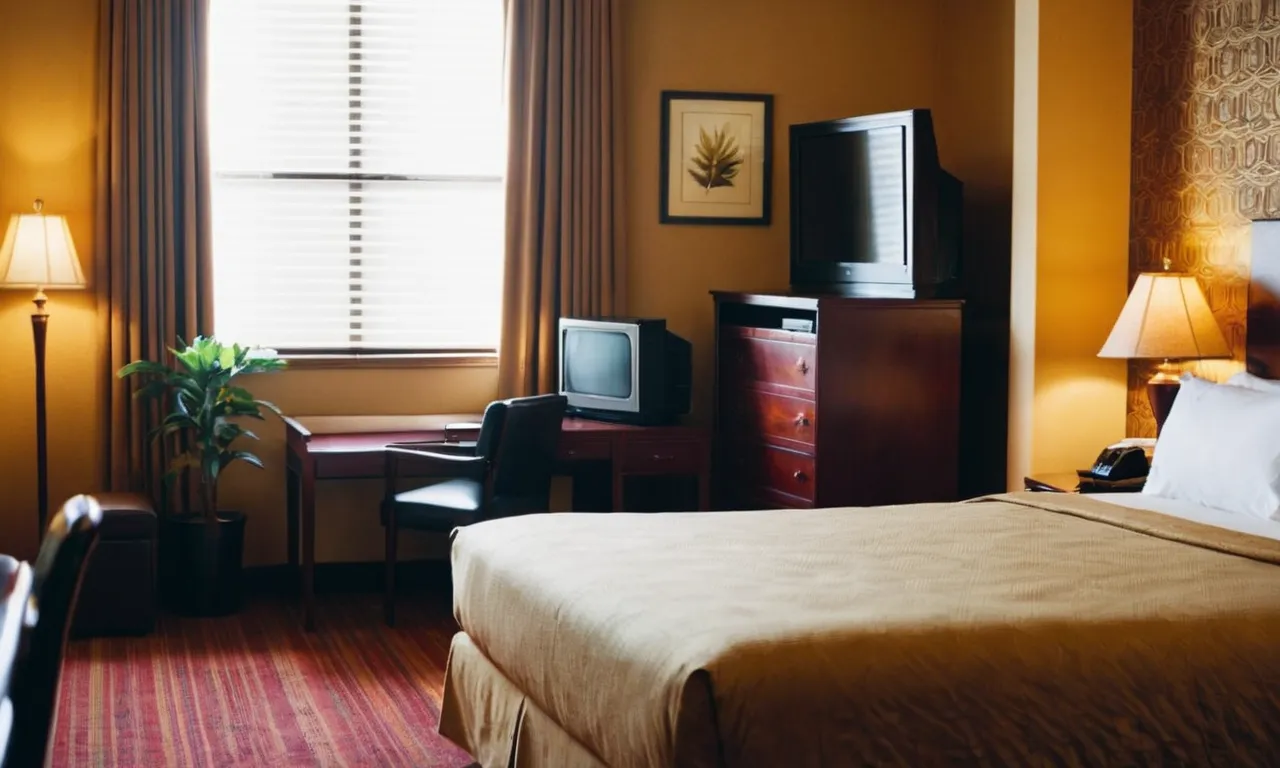When Does A Hotel Guest Become A Tenant In California?
Have you ever wondered when your stay at a hotel transitions from being a guest to becoming a tenant? This question is particularly relevant in California, where the laws surrounding tenancy rights can be complex and nuanced.
If you’re short on time, here’s a quick answer to your question: In California, a hotel guest typically becomes a tenant after 30 consecutive days of occupancy, or if they pay rent on a monthly basis.
In this comprehensive article, we’ll delve into the intricacies of California’s tenancy laws, exploring the factors that determine when a hotel guest’s status changes, the rights and responsibilities that come with being a tenant, and the potential legal implications of this transition.
Whether you’re a frequent traveler, a hotel owner, or simply curious about the subject, this article will provide you with valuable insights and practical information.
Understanding the Distinction: Guest vs. Tenant
When you check into a hotel, you’re typically classified as a guest. However, there comes a point when your stay transitions from being a temporary guest to a tenant with certain legal rights. This distinction is crucial for both hotel operators and guests to understand, as it determines the rights and responsibilities of each party.
Let’s delve into the definitions and key differences between a hotel guest and a tenant.
Definition of a Hotel Guest
A hotel guest is an individual who pays for temporary lodging at a hotel, motel, inn, or similar establishment. The key characteristic of a hotel guest is the transient nature of their stay. According to Hotels.com, in California, a hotel guest is typically someone who stays for less than 30 consecutive days.
During this period, the hotel retains the right to terminate the guest’s stay or refuse service without going through the formal eviction process required for tenants.
Definition of a Tenant
A tenant, on the other hand, is an individual who has established a more permanent residence at a property, often through a lease agreement. In California, if a hotel guest stays for more than 30 consecutive days, they may be considered a tenant under the state’s landlord-tenant laws.
As a tenant, they are entitled to certain rights and protections, such as the right to receive proper notice before being asked to leave and the right to a formal eviction process if they refuse to vacate the premises.
Key Differences Between Guests and Tenants
Here are some key differences between hotel guests and tenants in California:
- Length of Stay: Hotel guests typically stay for a shorter duration, usually less than 30 consecutive days, while tenants establish a more permanent residence.
- Legal Rights: Tenants have stronger legal rights and protections under California’s landlord-tenant laws, while hotels have more leeway in terminating a guest’s stay.
- Eviction Process: Tenants can only be evicted through a formal legal process, whereas hotels can ask guests to leave without going through an eviction procedure.
- Rental Agreement: Tenants typically have a written lease agreement, while hotel guests have a more informal arrangement governed by the hotel’s policies and terms of service.
It’s important to note that the California Civil Code provides specific guidelines for determining when a hotel guest becomes a tenant, taking into account factors such as the length of stay, payment arrangements, and the intent of the parties involved.
Understanding this distinction can help avoid misunderstandings and potential legal disputes between hotels and their guests or tenants.
The 30-Day Rule in California
Explanation of the 30-Day Rule
In California, the 30-Day Rule is a legal provision that distinguishes between hotel guests and tenants. According to Nolo.com, a reputable legal website, if a person stays in a hotel or motel for more than 30 consecutive days, they are considered a tenant under California law.
This rule applies even if the guest initially intended to stay for a shorter period.
The rationale behind the 30-Day Rule is to protect the rights of long-term occupants. After 30 days, the guest is entitled to the same legal protections as a regular tenant, including the right to proper notice before eviction and the right to a habitable living space.
This rule ensures that hotels and motels cannot exploit long-term guests by treating them as transient visitors without legal protections.
Exceptions to the 30-Day Rule
- Residential hotels: The 30-Day Rule does not apply to residential hotels, which are designed for long-term occupancy. In these cases, guests are considered tenants from the first day of their stay.
- Contracts: If a hotel or motel has a written contract with a guest stating that they will not become a tenant, the 30-Day Rule may not apply. However, such contracts are subject to strict scrutiny and may be deemed unenforceable if they violate public policy.
- Extended stay hotels: Some hotels cater specifically to long-term guests, offering amenities like kitchenettes and laundry facilities. In these cases, the 30-Day Rule may not apply, and guests may be considered tenants from the start.
Implications of Becoming a Tenant After 30 Days
When a hotel guest becomes a tenant after 30 days, they gain significant legal rights and protections. According to California’s Department of Consumer Affairs, some of these rights include:
- Proper notice before eviction (usually 30 or 60 days, depending on the circumstances)
- The right to a habitable living space, including adequate heat, water, and sanitation
- Protection against retaliation from the landlord for exercising their legal rights
- The right to privacy and freedom from unreasonable disturbances
Additionally, tenants may be entitled to a written rental agreement, security deposit protections, and the right to make minor repairs and deduct the cost from their rent. It’s important for both hotel operators and long-term guests to understand the implications of the 30-Day Rule to avoid potential legal disputes and ensure that everyone’s rights are protected.
According to a study by the Los Angeles Times, an increasing number of Californians are turning to hotels and motels for long-term housing due to the state’s affordable housing crisis. This trend highlights the importance of understanding the 30-Day Rule and its implications for both guests and hotel operators.
😊
Monthly Rent Payments and Tenancy Status
When a guest stays in a hotel for an extended period and pays rent on a monthly basis, the nature of their occupancy may shift from a transient guest to a tenant. This transition can have significant implications for both the guest and the hotel, as it establishes a landlord-tenant relationship governed by California’s landlord-tenant laws.
👍
Paying Rent on a Monthly Basis
According to Nolo.com, a legal website dedicated to consumer law, paying rent on a monthly basis is often a key factor in determining whether a hotel guest becomes a tenant. When a guest pays for their stay by the month rather than by the day or week, it suggests a more permanent living arrangement, which can trigger tenant rights and protections under California law.
😊
Establishing a Landlord-Tenant Relationship
Once a landlord-tenant relationship is established, the hotel is considered the landlord, and the guest becomes a tenant. This relationship comes with a set of rights and responsibilities for both parties.
The hotel, as the landlord, must provide habitable living conditions, respect the tenant’s privacy, and follow proper eviction procedures if terminating the tenancy. On the other hand, the tenant is responsible for paying rent on time, maintaining the premises, and adhering to the terms of the rental agreement.
Rights and Responsibilities of Tenants in California
As a tenant in California, individuals have certain rights and protections under state law. These include:
- The right to a habitable living space, free from serious defects or safety hazards
- Protection from unlawful discrimination based on factors like race, gender, or disability
- The right to reasonable notice before entry by the landlord (except in emergencies)
- The right to a refund of any security deposit, minus deductions for unpaid rent or damages
According to a California Department of Consumer Affairs report, approximately 15% of tenants in the state experience some form of housing dispute each year, highlighting the importance of understanding tenant rights and responsibilities.
By paying rent on a monthly basis and establishing a landlord-tenant relationship, hotel guests can benefit from these legal protections, but they also take on additional obligations as tenants. It’s crucial for both parties to be aware of their rights and responsibilities to ensure a smooth and legally compliant living arrangement.
Legal Considerations and Potential Disputes
Eviction Procedures for Hotel Guests vs. Tenants
The distinction between a hotel guest and a tenant in California can have significant legal implications, particularly when it comes to eviction procedures. Hotel guests are typically considered to have a license to occupy the premises, while tenants have a more robust legal interest in the property known as a “tenancy.”
This means that evicting a tenant requires following specific legal procedures outlined in the California Civil Code, including providing proper written notice and, in some cases, obtaining a court order.
According to California Courts, the eviction process for tenants can be more complex and time-consuming compared to removing a hotel guest. For instance, if a hotel guest overstays their reservation or violates the hotel’s policies, the management can generally request their departure without going through the formal eviction process required for tenants.
However, if the guest has established a tenancy by staying for an extended period or paying rent on a periodic basis, the hotel may need to follow the same eviction procedures as for residential tenants.
Resolving Disputes with Hotel Management
Disputes can arise between hotel guests or tenants and the management over various issues, such as charges, amenities, or accommodation conditions. In such cases, it’s essential to understand your rights and options for resolving the conflict.
The California Attorney General’s Office provides valuable resources and guidance for hotel guests, including information on resolving disputes through negotiation, mediation, or legal action if necessary.
If you believe you have established a tenancy at a hotel and are facing potential eviction or other tenancy-related issues, it’s advisable to seek legal assistance promptly. An experienced attorney can help you navigate the complex laws and regulations surrounding hotel tenancies in California and protect your rights as a tenant.
😊
Seeking Legal Assistance for Tenancy-Related Issues
When facing tenancy-related disputes or potential eviction from a hotel, seeking legal assistance can be crucial. Several organizations in California offer free or low-cost legal services to individuals in need.
For example, The State Bar of California provides resources to help find legal aid organizations and pro bono attorneys in your area.
Additionally, law school clinics and local bar associations may offer free or low-cost legal consultations and representation for tenancy-related matters. Don’t hesitate to explore these options if you’re unsure about your rights or need assistance navigating the legal process.
Resolving tenancy disputes can be complex, but with the right legal guidance, you can protect your interests and ensure a fair resolution. 👏
Conclusion
Understanding when a hotel guest becomes a tenant in California is crucial for both travelers and hotel operators. By adhering to the 30-day rule and being aware of the implications of paying rent on a monthly basis, individuals can better navigate the complexities of tenancy laws and protect their rights.
Whether you’re a frequent traveler or a hotel owner, it’s essential to stay informed about the legal distinctions between guests and tenants, as well as the rights and responsibilities that come with each status.
By being proactive and seeking legal assistance when necessary, you can ensure a smooth and hassle-free experience, avoiding potential disputes and legal complications.
Ultimately, the transition from a hotel guest to a tenant in California is a nuanced process that requires careful consideration and a thorough understanding of the relevant laws and regulations. By arming yourself with the knowledge provided in this article, you’ll be better equipped to make informed decisions and navigate the intricacies of tenancy in the Golden State.








